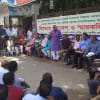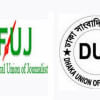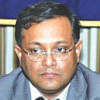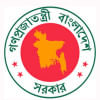Noab on 9th Wage Board: How realistic are the proposals?
The Newspaper Owners’ Association of Bangladesh (Noab) yesterday expressed concern over the 9th Wage Board proposal, saying such “unrealistic” proposals will create a great crisis in the newspaper industry which is going through a hard time.
Following is the translation of Noab’s full statement:
Newspaper owners always try to provide financial security and salary-allowance to journalists and employees. For this, despite difficulties, some newspapers have been trying to implement the government-announced wage board award. At present, however, the newspaper industry is passing a harder time than at any given point in the past. In such a situation, the unrealistic proposal of the 9th Newspaper Wage Board will create a great crisis for this industry. The chairman of the 9th Wage Board has finalised the wage board award unilaterally and submitted it to the ministry concerned. A cabinet committee has been formed to finalise the proposal. Recently, the committee has also taken an initiative in this regard.
Notably, the 7th and the 8th wage boards were also announced in such a unilateral way. In June 2008, in the 7th Wage Board, the basic salary was increased by 89.6 percent. In September 2013, the hike in the 8th Wage Board was 75 percent. For this reason, only a few newspapers could implement the 8th Wage Board. In this situation, the 9th (2019) Wage Board committee has submitted an unrealistic proposal, which includes an 85 percent salary hike. Implementation of this is not possible in any way. The few newspapers which implemented the wage board in the past will not be able to implement it now. The Newspaper Owners’ Association of Bangladesh (Noab) also opines that the award proposal of the 9th Wage Board is not realistic.
All over the world, the number of printed copies of newspaper is decreasing. In our country, print media circulation/market has been shrinking at an about 8-10 percent rate. Income from private advertisement has reduced at an annual rate of 20 percent. Such trend continues in 2019 as well. Apart from this, at present print media has to compete against television, online portal, social media and other different media. A large portion of the advertisement market is under the control of social media, online portals, Facebook and Google. On the other hand, the rate of government advertisement is very low. Even then, 15 newspapers have a due payment of about Tk 85 crore in advertisement bill, which they are to receive from the government. Besides, government advertisements have been decreasing at an annual rate of 10 percent. Apart from this, 26 percent is taken as landed cost, which includes import duty and VAT for newspapers’ main raw material-- newsprint. Perhaps, newspaper is the only product for which the production cost is three times the sale price. Due to reduction in advertisement income, it is becoming impossible to run the industry after overcoming such deficit. In such a situation, implementation of the unrealistic proposal of the 9th Wage Board will lead the newspaper houses to extinction. Notably, among the 42 government-recognised industries, salary-allowance and benefits of no other industry is like that of the newspaper wage board.
In the last two newspaper wage boards, the salary hike was 165 per-cent. In the last two government pay scales, the salary hike was 161 percent. In the last two wage boards for the RMG sector, the salary hike was 70 percent.
This means, salary hike in newspaper wage board is the highest. De-spite this, the 9th Newspaper Wage Board Committee has proposed the below unrealistic salary hike:
Grade Minimum Minimum
gross (present) gross (proposed)
1 67,645 1,16,095
2 51,980 90,095
3 38,073 67,112
4 25,420 44,962
5 22,595 39,889
6 20,231 35,670
At present, gross salary for the lowest grade (grade 6: peon, guard, gardener) under the 8th Newspaper Wage Board is Tk 20,231. Whereas, for a similar job, the gross salary for the lowest grade (grade-20) in the present government pay scale is Tk 15,350. It means, the salary for the lowest grade in the newspaper wage board is Tk 5,000 more than that of the government pay scale. And apart from the exception, in private companies, gross salary for the lowest grade is not more than Tk 10-12 thousand on average. In such a situation, the proposal of Tk 35,670 in salary for the lowest grade (grade-6) has been made under the 9th Wage Board. Noab thinks it is completely unrealistic in Bangladesh’s perspective.
As per the 8th Newspaper Wage Board, a reporter obtaining a bache-lors or master’s degree joins in grade-3 at a salary of Tk 38,073. Whereas, under the present government salary scale, the most meritorious student joins as a civil cadre in grade-9 at an initial salary of Tk 35,600. And a university teacher initially joins in grade-8 and receives a gross salary of Tk 37,150. This means, a reporter here, as per the newspaper wage board, has been getting Tk 2,473 more than that of a government first-class gazetted officer. And apart from the exception, in private companies, the gross salary at a similar level is no more than Tk 25-30 thousand on average. In such a situation, the initial salary of a grade-3 reporter has been proposed at Tk 67,112 in the 9th Newspaper Wage Board. Providing such a salary is impossible for any newspaper house.
The government announces the wage board for journalists working in the newspaper industry. And newspaper houses have to bear this wage board’s expenditure by increasing their own income. In this case, no special assistance and donation is provided from the gov-ernment’s end. Noteworthy, neither is there any benefit. At present, in the competitive market and digital media era, newspaper houses cannot increase their income at will.
According to the BBS and the Bangladesh Bank, the inflation rate has risen to 36.34 percent since the implementation of the 8th Wage Board. During this period, if one yearly increment as per the 8th Wage Board is taken into consideration, the salary has increased by about 28.8 percent. In reality, the amount of salary increase is much higher. To retain or motivate skilled workers, excessive salary is often given. Therefore, Noab opines, it is not possible to increase the salary more than 10-12 percent in the 9th Wage Board.
Besides, there are some matters and benefits in the 9th Wage Board which cannot possibly be fulfilled by an ailing newspaper industry. For example:
• There are 6 grades in the wage board. The government’s na-tional salary scale has 20 grades. Most of the private organisations, including banks and insurance companies, have between 18 and 22 grades. Due to the lesser number of grades in the wage board of newspapers, it becomes difficult to operate the organisation.
• According to section 2 (10) of the Bangladesh Labour Act, there is a provision of one gratuity for each year. In other industries, there is not more than one gratuity each year. Many organisations do not even follow the provision of the Act, whereas the provision of two gratuities in the wage board is an impractical financial pressure.
According to the Income Tax Ordinance 1984, individuals should pay their income taxes. But under the wage board, newspapers pay the income taxes of journalists and other officials and employees. Workers of other organisations including government ones submit their income taxes individually. There should not be a law that doesn’t apply to all.
•In the 9th Wage Board, house rent is fixed at 65 percent. But according to section 33(A) of the Income Tax Ordinance, 1984, 50 percent of the house rent is tax-free. The rest 15 percent increases the amount of individual tax.
•In the newspaper wage board, there is a provision for granting one month’s salary and one month’s recreation leave every three years. The benefit is not available in any other government recognised industry.
•Besides, there are some marginal benefits that are not realistic and nobody implement these. These should be eliminated from the wage board. For example: duty allowance, entertainment allowance, technical allowance, eye-risk allowance, chemical poisoning allowance, outfit allowance, dress and wash allowance etc.
•Although the newspaper is an industry, its corporate tax is 35 percent.
•Although the newspaper industry is listed in the schedule-2 (exemption) of the Vat Act 1991, it has to pay 15 percent VAT.
•According to 53(k) of the VAT Act, 1991, about 4 percent TDS/AIT are being given on the income from newspaper advertisement. Besides, 5 percent TDS are being paid at source of import of raw materials. Overall, 9 percent TDS are being paid. But many newspaper organisations do not even make 9 percent in profit.
Although Noab members participated in the 7th and 8th wage boards actively, their past experiences are not good. In all wage boards, the above issues were brought up by the Noab. But the wage boards were announced almost unilaterally without discussing the issues. The Noab had expected that this time, the activities of the wage board would at least be held through discussions during the formulation of the 9th Wage Board. But so far, the experience over the 9th Wage Board has been no different.
Wage board has been limited to wage-allowance as no opinion of owners are considered. It is weakening the industry day by day. Failing to cope with the unrealistic financial pressure, the organisations would downsize, not implement or partially implement the wage board, and on the whole, chances are being created that the organisations would be at the brink of closure.
According to the latest (June 3, 2019) audit report of the De-partment of Films and Publications, of the country’s 684 (Dhaka-346 + local- 338) newspapers, 158 (about 23 percent; Dhaka- 109 + local- 49) have implemented the 8th Wage Board. But there is no similarity between the report and reality. To Noab’s knowledge, only a handful of newspapers fully implement wage board award.
So, before issuing a gazette on the 9th Wage Board, it is necessary to have discussions with both owners and journalists and announce an acceptable and realistic award based on consensus. Wellbeing of workers of an industry depends on the wellbe-ing of the industry.

 For all latest news, follow The Daily Star's Google News channel.
For all latest news, follow The Daily Star's Google News channel. 








Comments